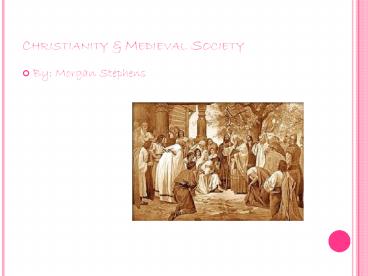Later Middle Ages. - PowerPoint PPT Presentation
Title:
Later Middle Ages.
Description:
later middle ages in europe. – PowerPoint PPT presentation
Number of Views:789
Title: Later Middle Ages.
1
Christianity Medieval Society
- By Morgan Stephens
2
The church shapes politics and society
- Clergy- church officials. Their teachings were
very influential in European culture and
politics. - Society- life revolved around the local church.
Markets, festivals, and religious ceremonies took
place there. - Politics- the church also gained political power
in the Middle Ages.
3
Monks friars
4
The monks of Cluny
- Religious order- group of people who dedicated
their lives to religion and follow common rules. - Living apart from society- most monks lived
apart from the society.
5
New orders
- Some monks thought that even Cluny's rules
weren't strict enough. So, they created new
orders with even stricter rules.
6
friars
- Francis of Assisi- founder of Franciscan order.
- Friars- Members of religious orders who lived and
worked among general public. - Living within the society- friars lived within
the society.
7
Universities are built
- Religion, law, medicine, and philosophy were
taught in the universities.
8
Thomas Aquinas
- Philosopher who showed how religious faith and
reason could co-exist. - Wrote a reasoned argument for the existence of
God.
9
Natural law
- Thomas Aquinas concept that god created a law
that governed how the world operated.
10
The church and the arts
11
Religious architecture
- Their spires and high ceilings and colorful
windows were all work of architecture to bring
people closer to God.
12
Religious art
- Everything inside the church, from the walls to
the clergys robes to the books used, were works
of art.
13
Magna Carta changes in England!
14
Magna carta
- Document written by English nobles and signed by
King John listing rights the king could not
ignore. Among these rights, no one could be kept
in jail without a reason, and even the king had
to obey these laws.
15
Who demanded this agreement?
- The nobles demanded this agreement because they
got fed up with the King punishing the people for
actions they didnt do.
16
Effects of magna carta
17
What were the effects of magna carta?
- The Magna Carta led to more changes. They were
faced with war and financial troubles, the king
turned to a council of nobles for advice and
money.
18
Three of the demands and why they were important
- People demanded judges be free of loyal control.
This creation independent judicial system was a
key step in bringing democracy to England. - They wanted the king to obey the laws just like
they did. The idea that everyone must follow the
law became one of the basic principles of English
government. - They wanted the king to have limited power. So,
he didnt get overwhelmed with power.
19
Changes after magna carta
20
What did magna carta inspire the noble to do?
- Magna Carta inspired the noble to give kings
advice and money.
21
parliament
- The lawmaking body that still governs England
today. The council developed into this.
22
How did the king limit magna carta?
- He turned to a council of nobles to get advice
from them and also get money. They couldnt
control Magna Carta by themselves.
23
The hundred years war
24
The course of the war
- The war started when the English king tried to
take control of the French throne.
25
French king dies with no heirs
- The king died with no children. This left the
throne without a king to rule France. This lead
to the 100 years war.
26
Two men claim throne
- Man 1 the first man was an English king. When he
tried too take over the throne another person
tried to take over. - Man 2 he was a French person. He would most
likely to win because he isn't a king and he
lives in France.
27
English take the lead
- The English took the lead when they invaded
France and won the key battles.
28
Joan of arc
- During the hundreds year wars was rallied by the
France troops. She was caught and then killed.
She was burned alive. She died in a painful
death, but she was made famous in history.
29
Results of the war
30
Changes in England
- The war helped increase the power of Parliament
because the king needed Parliament approval to
raise money to pay for the war.
31
Changes in France
- The kings power grew after the war.
32
Democracy
- Will democracy have to wait in France? Democracy
had to wait because after the war the kings power
grew.
33
Black death
- Deadly plague that killed millions of Europeans
between 1347 and 1351.
34
Where it came from
- The plague originally came from central and
eastern Asia.
35
How it spread
- Traders unknowingly brought rats carrying
diseases to Mediterrian ports. From there it
quickly swept throughout much of Europe. Fleas
that fed on infected rats passed on the plague to
people.
36
What disease was it?
- One disease was called the bubonic plague.
Swellings called buboes appeared on victims
bodies.
37
Effect on Manor life and feudalism/how many died
- The manor system fell apart completely. There
were not enough people left to work in the
fields. This plague killed millions of people. It
killed so many, that over a third of Europe's
population was killed.
38
What happened to it?
- Those who survived found their skills in high
demand.. Suddenly, they could demand wages for
their labor. Once they had money, many fled their
manors completely, moving instead to Europe's
growing cities.
39
Thanks for watching my slide show! Hope you all
enjoyed! ?































